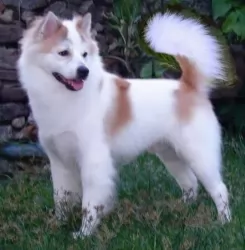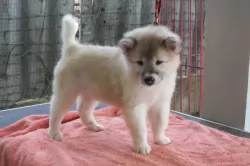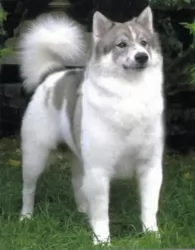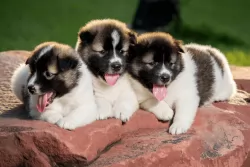 MyDogBreeds
MyDogBreeds Thai Bangkaew is originated from Thailand but Dingo is originated from Australia. Thai Bangkaew may grow 7 cm / 2 inches shorter than Dingo. Thai Bangkaew may weigh 6 kg / 13 pounds lesser than Dingo. Thai Bangkaew may live 6 years less than Dingo. Both Thai Bangkaew and Dingo has same litter size. Both Thai Bangkaew and Dingo requires Moderate maintenance.
Thai Bangkaew is originated from Thailand but Dingo is originated from Australia. Thai Bangkaew may grow 7 cm / 2 inches shorter than Dingo. Thai Bangkaew may weigh 6 kg / 13 pounds lesser than Dingo. Thai Bangkaew may live 6 years less than Dingo. Both Thai Bangkaew and Dingo has same litter size. Both Thai Bangkaew and Dingo requires Moderate maintenance.
 The Thai Bangkaew breed comes from a small village in the Bang Rakarn District of the Phitsanulok Province, in Thailand. The breed is named after that village of Bangkaew. A wild dog was crossed with a Buddhist abbot’s black and white female. Today’s Bangkew is the direct result of breeding only from the litters produced from these original two. Some believe the wild dog was a jackal that is now extinct. The breed is similar to a Spitz and is a good hunter and an intelligent family member. However they still maintain some of the wildness of the jackal.
The Thai Bangkaew breed comes from a small village in the Bang Rakarn District of the Phitsanulok Province, in Thailand. The breed is named after that village of Bangkaew. A wild dog was crossed with a Buddhist abbot’s black and white female. Today’s Bangkew is the direct result of breeding only from the litters produced from these original two. Some believe the wild dog was a jackal that is now extinct. The breed is similar to a Spitz and is a good hunter and an intelligent family member. However they still maintain some of the wildness of the jackal.
The Thai Bangkaew was developed to be a guard dog and alert their owners of any strangers or dangers. By 1957 the dog we know today we being developed through selective breeding. They are not recognized today by the AKC. These facts have made it a very rare breed that is hard to find outside southeast Asia. They are great outdoor companions.
 The Dingo dog was in all probability, introduced to Australia thousands of years ago. He isn’t your usual domesticated dog and in fact it is a feral dog native to Australia.There are stories that suggest that while they may have once been pets, they were abandoned so that they reverted back to their wild state.
The Dingo dog was in all probability, introduced to Australia thousands of years ago. He isn’t your usual domesticated dog and in fact it is a feral dog native to Australia.There are stories that suggest that while they may have once been pets, they were abandoned so that they reverted back to their wild state.
They became pests for Australian farmers, going for their livestock, and huge fences were erected. The different climates in Australia have meant different kinds of Dingo developing, so while the desert ones are like the desert sands - golden yellow to red the alpine ones are rarer and are cream colored.
These wild canines were also introduced to Southeast Asia some 3,500 years ago, however the dog’s exact origin is debatable. There are any number of groups of people who could have brought the dingo to Australia, and among some of these are Indian mariners or maritime hunters.
The dog has been found in many parts of mainland Australia but never became established in Tasmania.There has also been an effort to remove the Dingo from farming areas. It is interesting to note that the first Dingo, referred to as the Australian dog, was registered at the London Zoo in 1828.
 A compact and square dog, the Thai Bangkaew is a well proportioned breed with a gait that is smooth. They have a deep, wide chest with muscular and strong neck. The head is also square, the ears pointed and the eyes brown and average size. They have a double coat and a longer, thicker ruff. Their chest and back also have a ruff like a lion. The tail is plumed and carried up high and curves over the dog’s back. Their coat is water-repellent.
A compact and square dog, the Thai Bangkaew is a well proportioned breed with a gait that is smooth. They have a deep, wide chest with muscular and strong neck. The head is also square, the ears pointed and the eyes brown and average size. They have a double coat and a longer, thicker ruff. Their chest and back also have a ruff like a lion. The tail is plumed and carried up high and curves over the dog’s back. Their coat is water-repellent.
 An interesting fact with these fascinating feral dogs, is that like humans, they’ve got rotating wrists. This characteristic of theirs allows them to use their paws much like the human hand to catch their prey. A domesticated Dingo can therefore learn how to open doors.
An interesting fact with these fascinating feral dogs, is that like humans, they’ve got rotating wrists. This characteristic of theirs allows them to use their paws much like the human hand to catch their prey. A domesticated Dingo can therefore learn how to open doors.
The Dingo is a medium sized dog standing at roughly 52 – 60cm in height, measuring up to 1.2 meters in length and weighing roughly between 23 to 32kg.
He has long canine teeth, a long muzzle, upright ears and a long, thick tail. The coat is essentially one color, sandy, white, cream, tan or black and sometimes there are white markings on the chest, the paws and around the muzzle.
The fur is typically shortish and thick — though the hair's thickness and length will depend on the climate of the area. The Dingo is a moderate shedder and a good brushing of the coat twice a week will keep the thick coat shiny and healthy.
These wild canines are social animals, and in the wild they live in packs. There are some that opt to live on their own.
They’e territorial, but they are able to share their living space with humans. They’re generally shy around humans, but a Dingo that is trained and socialized can get along well with children and pets in the home.
 1.Children friendliness – yes with early and proper socialization be watchful with small children
1.Children friendliness – yes with early and proper socialization be watchful with small children
 Dingoes have been domesticated successfully. Some people swear by them as making a fantastic pet. However, they’re wild dogs and can be unpredictable.
Dingoes have been domesticated successfully. Some people swear by them as making a fantastic pet. However, they’re wild dogs and can be unpredictable.
There are others who have tried to keep the Dingo as a pet but who have discarded them when they proved to be a danger in the home.
Dingoes can be trained but they’re high energy dogs and require a lot of exercise. How do you feel about owning a Dingo as a pet? Many people feel that its not fair to bring an essentially wild animal into your home. They feel that there are plenty of rescue dogs dying for a home without human beings searching in the wilds for an unusual pet, and regretting it later on.
 This is a very healthy breed with a relatively clean genentic pool. The dogs tend to be healthy. They have no congenital health issues. However they do contract some normal canine issues.
This is a very healthy breed with a relatively clean genentic pool. The dogs tend to be healthy. They have no congenital health issues. However they do contract some normal canine issues.
 The Dingo is a long-lived dog and you can expect your Dingo to live till anything between 15 and 20 years.
The Dingo is a long-lived dog and you can expect your Dingo to live till anything between 15 and 20 years.
When it comes to health issues, they are robust and resilient, having less medical problems to contend with than your regular dog.
However if you see that your Dingo is not his usual robust, energetic self, get him to the vet as soon as you can.
 . Feeding the puppy Feed a high quality high protein puppy food for medium sized dog. Feed 2 cups in 3-4 meals per day.
. Feeding the puppy Feed a high quality high protein puppy food for medium sized dog. Feed 2 cups in 3-4 meals per day.
2.Feeding the adult Feed a high quality high protein adult food for medium sized dog. Feed 2.5 cups in 2 meals per day
4. Games and Exercises they need daily exercise and they love to swim. He loves to dig and is a climber as well. Good at herding, barnchase.
 Caring for your Dingo will be different to caring for your usual pet dog. You have to remember the Dingo is an ancient, wild species with some unique characteristics. Having a Dingo as a pet and companion may not be an easy task, and it is why many people selfishly dump their Dingoes – they didn’t quite live up to what they had in mind.
Caring for your Dingo will be different to caring for your usual pet dog. You have to remember the Dingo is an ancient, wild species with some unique characteristics. Having a Dingo as a pet and companion may not be an easy task, and it is why many people selfishly dump their Dingoes – they didn’t quite live up to what they had in mind.
Your Dingo, just like any other dog you’d have, will require training and socialization, and the earlier the better. No training will simply mean you having an unruly pet in the home.
Your Dingo can be fed just like you would with your other dogs. You can feed him quality dog kibble as his main diet, but you can also add in cooked rice, vegetables and chicken. Your Dingo is essentially a wild dog, so you will definitely want to include some raw meat into his diet from time to time as well.
A Dingo is used to running free so he will require plenty of outdoor exercise. He can also be put on a leash and taken for a walk. He’ll love joining you in your activities such as running alongside you as you jog or cycle. He can adapt to life in the city if he is well exercised but he isn’t suited to a small home or garden.